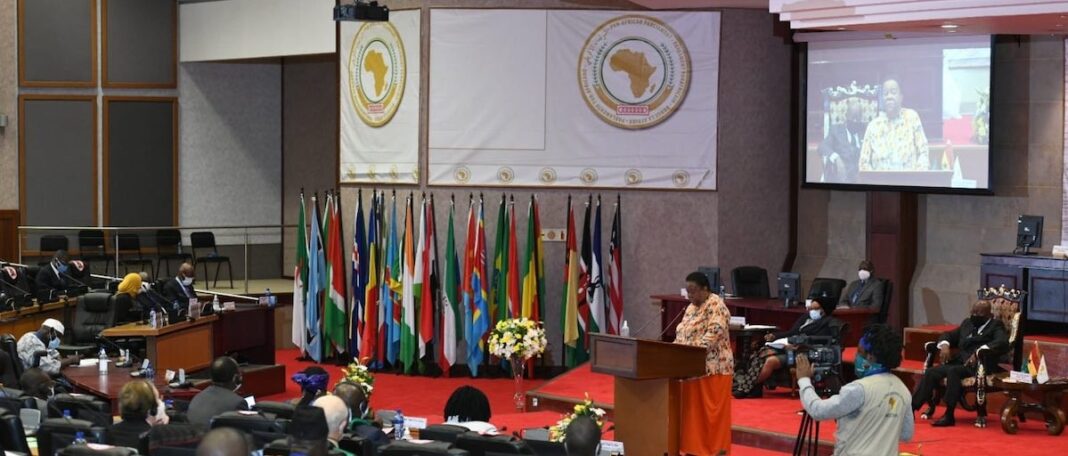The Pan-African Parliament (PAP), also known as the African Parliament, is working around the clock to restore its image under the new leadership following the scenes that hogged headlines last year.
This is after the PAP descended into chaos with some of the Members of Parliament (MPs) exchanging blows over the principle of regional rotation in the election of the Bureau, forcing the session of May 2021 to be aborted.
The Chairperson of the Southern Caucus of the Pan-African Parliament (PAP), Ms Pemmy Majodina, tabling the report on the region's recommendations for amendments in the PAP Rules of Procedure. pic.twitter.com/bnHvjHQ2mz
— Parliament of RSA (@ParliamentofRSA) October 27, 2022
The discourse emitted from the southern and northern delegates demanded the rotation of leadership in other African five regions, saying the position should be rotated to end the dominance of regions.
“First of all, what was seen on TV were unfortunate events and it’s important to note that Parliament is back and fully functional,” said PAP Acting Head of Media and Communications, Jeffrey Onganga.
“There’s a new Bureau that was elected in June 2022 and since then, a lot has been done to repair the image of the Pan-African Parliament and African leaders as a whole.”
Now, all eyes are on the first Ordinary Session of the sixth Parliament, which is off to a good start.
The Session, which kicked off on 24 October 2022, is taking place at the headquarters at the Gallagher Convention Centre in Midrand, Gauteng.
The sitting is guided by the African Union (AU) theme of 2022, ‘Building resilience in nutrition on the African continent: Accelerate the human capital, social and economic development’.
PAP President, Chief Fortune Charumbira, is also expected to outline the Bureau’s vision to “revive, renew, reposition, and reinvigorate” the African Parliament.
Meanwhile, MPs will dissect the report on the status of peace and security in Africa and hold a debate on the African Continental Free Trade Area Agreement (AfCFTA), as well as recommendations and resolutions on labour migration in Africa.
Onganga has shot down the notion that the PAP is an “expensive talk shop”.
“We must not undermine the power that comes with Parliamentarians from all over the continent convening. A Parliamentarian from South Africa, meeting with a Parliamentarian from Equatorial Guinea – there is something that comes from it,” he stressed.
“There is no way the African Union executive can to go every country, every day, talking to every citizen.”
For this reason, he believes that the PAP, whose Member States delegates attend the sittings twice a year, remains the best mechanism to reach the people.
PAP has been criticised for lacking real power. Only 14 of the AU’s 54 Member States have ratified a 2014 agreement – known as the Malabo protocol – to give the Parliament legislative powers. At least 28 countries are needed for this to happen.
“One of the priorities of this Parliament is for its members to ratify this protocol because that gives more power to this Parliament and it addresses more concerns. It gives people the opportunity to see this Parliament in a position that allows it to do the work that it is supposed to do,” he explained.
In the meantime, the Institute for Security Studies (ISS) said PAP exercises purely advisory and administrative powers compared to the European Parliament in Strasbourg, which is directly elected by the European people and enjoys significant powers.
However, Onganga said the PAP President is hopeful that African Parliament will get there.
In addition, he said, the Parliament was intended as a platform for people from all African States to be involved in discussions and decision-making on the problems faced by the continent.
“The role of the Parliament isn’t to go and build a bridge in Sierra Leone. But the role of Parliament is that if you promise to build a bridge and that bridge is built,” he explains.
“It is also to ensure that if the African Union decides to help women entrepreneurs in the country is that they follow through with that decision.”
He said the AU does not have an issue with making decisions, of which many have been taken to improve the lives of citizens.
“What we want to do is before we make more decisions, we go back and ensure that we’ve implemented at least half of the decisions that we’ve taken,” he said.
“Parliament wants to make this platform very visible so that the Chairperson and all the Commissioners are invited to come and explain that this Parliament takes more fact-finding missions. You can’t hold an executive into account if you don’t see what they’re doing in certain countries.”
Currently, PAP is investing its energies to ensure the people on the ground, according to Onganga, feel their presence.
“So what are the key things that this Parliament wants to do is to be more present in some of these countries. Visibility is key.”
Meanwhile, the spokesperson said the AU’s key priority this year is food security.
“In 2022, we still have people who don’t have enough to eat and go to bed with an empty stomach.”
He believes that the aspirations of AU’s Agenda 2063, a framework for inclusive growth and sustainable development for Africa, cannot be achieved if some people do not have food.
“Of course, safety and security, you need a continent that is peaceful to achieve any agenda that you want to implement.”
In addition, he mentioned that an unconstitutional change of governance in some countries is something that preoccupies Parliamentarians.
“The President believes that there is more than the Pan-African Parliament and that even though we still don’t have legislative powers, the current consultancy and oversight and advisory function that we are given are enough for Parliament to address these issues.”
– SAnews.gov.za

